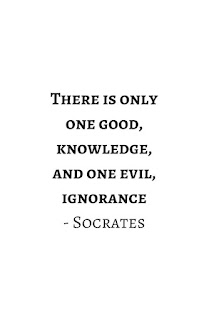Knowledge is wisdom
Knowledge is often regarded as the foundation of wisdom. While the two concepts are related, they are not synonymous. Knowledge encompasses information, facts, and data that one acquires through learning and experience. It forms the basis for understanding the world and making informed decisions.
Wisdom, on the other hand, goes beyond knowledge. It is the ability to apply knowledge in a thoughtful and discerning manner. Wisdom involves the capacity to make sound judgments, to consider the broader implications of one's actions, and to navigate complex moral and ethical dilemmas. Wisdom is shaped by experience, reflection, and a deep understanding of the human condition.
In essence, knowledge is the raw material, while wisdom is the refined product that emerges from the thoughtful application of that knowledge. It is the transformation of information into insights that guide one's actions in a way that benefits not only oneself but also others and society as a whole. Therefore, knowledge is a crucial step on the path to wisdom, but it is wisdom that ultimately leads to a more profound and meaningful understanding of life.
Education by definition is the act or process of imparting or acquiring general knowledge, developing the power of reasoning and judgments, and generally preparing oneself or others intellectually for mature life.
Education is the process of facilitating learning, or the acquisition of knowledge, skills, values, beliefs, and habits.
Education methods include storytelling, discussion, teaching, training, and directed research. Education systematic process through which adorn adult acquires knowledge, experience, skill and sound attitude. It makes an individual civilized and socialized, education is the only means. Its goal is to make an individual perfect. Every society gives importance to education because it is a panacea for all evils. It is the key to solving the various problems of life.
Education has been described as a process of waking up to life: Waking up to inter-dependencies of all things, to the threat of our global village, to the power within the human race to create alternatives, obstacles entrenched in economic, social-political structures that prevent our waking education in the broadcast sense of the term is meant to aid the human being in his/her pursuit of wholeness.
Wholeness implies the harmonious development of all the potentialities God has given to a human person. Finally, true education is the harmonious development of the physical, mental, moral (spiritual), and social faculties, the four dimensions of life, for a life of dedicated service.
Knowledge and wisdom are two essential facets of human understanding, yet they reside on different points of the spectrum of comprehension. Knowledge is the bedrock upon which wisdom is erected. It represents the accumulation of information, facts, and data gathered through learning, study, and experience. Knowledge encompasses what we know about the world, its systems, and its workings. It is the repository of information that forms the basis of our understanding. However, knowledge, on its own, is like a library filled with books waiting to be read; it holds the potential for insight but requires a guiding hand to unlock its true potential.
Wisdom, on the other hand, transcends the mere possession of knowledge. It is the art of using knowledge thoughtfully and judiciously. Wisdom entails the ability to apply knowledge in a discerning manner, making sound judgments and decisions that consider not only the immediate context but also the broader implications and ethical dimensions. Wisdom is not merely knowing the facts; it is about understanding how those facts interconnect, appreciating the subtleties of human nature, and recognizing the consequences of one's actions on oneself and others. It is the bridge that links knowledge to a life well-lived, where choices are made with a deep sense of moral and ethical responsibility.
While knowledge and wisdom complement each other, they differ fundamentally in their essence. Knowledge provides the substance—the facts and information—that underpins understanding, while wisdom is the alchemy that transforms that substance into meaningful, practical, and ethical decisions. Knowledge may inform us about the world, but wisdom guides us in navigating it with grace, compassion, and a profound sense of what truly matters. In essence, knowledge is the foundation, and wisdom is the pinnacle of human understanding, representing the profound journey from knowing to knowing how to live.








No comments:
Post a Comment